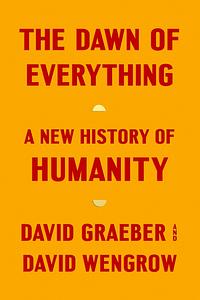You need to sign in or sign up before continuing.
Take a photo of a barcode or cover
informative
slow-paced
challenging
hopeful
informative
inspiring
reflective
relaxing
slow-paced
The Dawn of Everything: A New History of Humanity, as its title implies, is a gargantuan tome that makes a compelling case for the re-framing of traditional ideas of the emergence of our current political and societal systems, especially regarding hierarchy and the state. David Graeber and David Wengrow provide abundant evidence from contemporary archaeology to introduce broad, but impactful, ideas. I was specifically interested in a few concepts I hadn't seen elsewhere:
- The process of "schismogensis," the formation of a society's belief system in contrast to that of a neighboring society (which feels particularly relevant in today's globally polarized world)
- From prehistory, there have been three basic forms of freedom: the freedom of relocation, the freedom to ignore or disobey commands issued by others, and the freedom to de-construct and re-construct social realities
- Conversely, there are also three elementary forms of domination: control of arbitrary violence (sovereignty), control of knowledge (bureaucracy), and charismatic power (heroic politics), which can be combined in first or second-order governance
- We should assume that ancient peoples were our intellectual equals, i.e. just as aware of social structures as us, and just as curious on how to make them more dynamic
- Egalitarianism is not impossible in large-scale societies, just as other institutions associated with states, e.g. slavery and authoritarianism, are not impossible in small-scale settlements
Above all, The Dawn of Everything is a deconstruction of academic consensus regarding the origins of inequality and civilization (drawn largely from Jean-Jacques Rousseau and Thomas Hobbes), emphasizing that there is nothing "inevitable" in history, and how we choose to organize ourselves does not have to be set in stone. Incredibly well researched and surprisingly hopeful in its emphasis on our individual agency, I think this work is a masterpiece.
I took like 3 months to read this okay but it was very nicely done ngl and brimming with insights that were helpfully summarised in the conclusion. Would be genuinely revolutionary to my life if I were actually engaged with anthropology in any substantial way. Glad that they dragged Yuval bc I was never able to get into him and now I can feel superior. I do find myself being very “omg what if cannot assert narratives about humanity what if these people are wrong XD” especially because their portrayal of humanity is very pro anarchist ngl which is sth i am quite happy with but am skeptical of bc of societal conditioning but it’s nice to see some reasoning for graeber’s anarchist leanings which i learnt about in bullshit jobs though he never explained them there.
This was a very long read, but understandably so. The main premise of the book is trying to understand where inequality in our society originates, why societies are constructed in the current fashion, and what freedom means all by giving context from early human “civilization” (authors are hesitant to the connotations the word civilization has had). Along the way, new ways of conceptualizing early human history is developed. Generally this book is written from an optimist’s point of view which helps me, I struggled with Sapiens by Yunnus because it seemed to be nihilistic. If you are interested in the nexus of sociology and history I think this is an awesome book for you.
informative
slow-paced
hopeful
informative
inspiring
reflective
medium-paced
slow-paced
Challenges common narratives about the origins of current human society and prehistory, especially in the political realm
Goodreads published this before I was done writing it. I've got quite a lot to say about this excellent book, and I will add it all later when I actually have time.
Right off the bat, Graeber lays down some wonderfully commentary on how the history and societies are more nuanced and interesting than is normally let on. He speaks of how we often become trapped in seeing the world in some extreme, either hobsian or that other one, but the reality was more complex.
Take for example colonialism. For
Right off the bat, Graeber lays down some wonderfully commentary on how the history and societies are more nuanced and interesting than is normally let on. He speaks of how we often become trapped in seeing the world in some extreme, either hobsian or that other one, but the reality was more complex.
Take for example colonialism. For
challenging
hopeful
informative
reflective
slow-paced
-it presented so many new ideas and ways of looking at history, societies and humanity.
-it made my brain think about things in different ways
-multiple time throughout I had to stop and look further into an idea or civilisation.
However it was very dense. Almost felt at times I was reading scholarly research.
-it made my brain think about things in different ways
-multiple time throughout I had to stop and look further into an idea or civilisation.
However it was very dense. Almost felt at times I was reading scholarly research.



